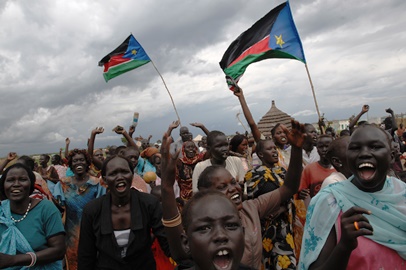Abyei appeals for accelerated discussions over referendum commission
September 21, 2010 (MALAKAL)-With looming pressures and repeated calls on the two peace partners to break a deadlock on Abyei, acting chief administrator, Kuol Monyluak, on Tuesday called on the parties to accelerate discussions over the establishment of the referendum commission.
 He also called for restraint in demands to freeze settlements on areas inside demarcated boundaries by the ruling of permanent court of arbitration.
He also called for restraint in demands to freeze settlements on areas inside demarcated boundaries by the ruling of permanent court of arbitration.
Border demarcation is a key issue in the run-up to the referendum in which the southern Sudanese will be given the opportunity to vote on secession. The vote is scheduled for January 2011 but is lagging behind due to many unresolved issues, including the statehood of border areas, many of which are oil-rich.
“In order to succeed in these negotiations both parties need to understand that neither side can come out with all that they want, especially when it involves resources,” said Monyluak, describing the dispute over the area as an indicator of a political fight over resources.
He made the remark while addressing a gathering organized to observe international peace day in Abyei Freedom Square, southern Sudan. The function organized under the theme “Peace, Youth and Development,” attracted participation of government officials, representatives of the United Nations (UN), international organizations, civil society organizations and the local community.
Speaking of the values “diversity, equity, learning to live together, reconciliation, forgiveness, trust, compassion, tolerance, benevolence, mutual understanding, and collective community efforts and living in solidarity” that the event embodied, Monyluak said that ” these themes are even more critical when we look at own current Abyei context.”
He expressed his view that, “the fight over Abyei is not about land. It is not about territorial differences between the two tribes in reference to Dinka Ngok of Abyei and their neighboring Messeriya. It is about resources.”
“If it is about land, why are the other neighboring areas to the south, east and west not complaining? Why are there no complaints from Northern Bahr el Ghazal, Unity, Warrap and many more?” asked Monyluak.
He called for, “critical thinking and understanding with good faith on broader issues. The first task for spirit of compromise on both sides is to break deadlock. If they say no compromise it’s a bad sign.”
Speaking from Juba, Abyei Chief Administrator, Deng Arop Kuol, said that if talks over the region resume, settlement and ongoing construction must be addressed as priority.
“There is no need to allow people to settle in areas that have already been demarcated [for construction]. This must be addressed as a priority. The border demarcation technical committee must be allowed to resume their work before referendum,” explained Kuol in a telephone interview with Sudan Tribune .
Responding to comm
ents, Hassan Musa, one of the leaders of the Messeriya tribe in Muglad told Sudan Tribune that the Meseriya “position for peaceful coexistence with brothers from Dinka Ngok has not changed. “
“If we have lived together peacefully for over six decades why not continue it?” asked Hassan.
He placed blame on the signing, in January 2005, of the Comprehensive Peace Agreement (CPA), which saw northern and southern Sudan lay down arms after 22 years of civil war. “We have had no territorial differences to such extent in the past. These differences came as result of the Comprehensive Peace Agreement which creates borders between us. We have never had borders but lived peacefully with our brothers,” explained Musa. One stipulation of the CPA is the up-coming plebiscite vote.
Juac Agok, Sudan People’s Liberation Movement (SPLM) Deputy Chairman in Wau, capital of Western Bahr el Ghazal State, in a separate interview with Sudan Tribune on Tuesday, called on the ruling National Congress Party (NCP) to respect and abide by the ruling of the permanent court of arbitration.
“The National Congress Party accepted referral of the Abyei boundary commission to the permanent court of arbitration in 2009 and pledged to the international community to honor the outcome of the ruling. The SPLM also did the same and we remain committed to our position. We expect our partner to remain with the same position but some voices from national congress appear to be reneging pledges they made to the international community,” explained Agok.
He also opposed those calling for flexibility in the creation of a joint administration in the area, saying there is no basis on which the new proposal should be adopted.
“Flexibility and creativity does not apply in legality,” he told Sudan Tribune from Wau. “Neither the CPA nor the permanent court of arbitration will create a joint administration. The two documents do not have references which can be used to substantiate such a proposal. If we are unable, and with us, the entire world, to persuade Messeriya to only freeze its illegal settlement expansion, how does it work, why not embark on a process that should discuss the dismantling of settlements and the ending of the occupation?” Agok spoke in reference to the Messeriya tribe living on the disputed land with the Dinka Ngok.
Miyen Alor Kuol, a member of the SPLM and one of senior officials from the area on Monday called on the NCP not to impose conditions for the talks.
“I want the National Congress Party to give these talks a chance to succeed. And I very much hope that the presidency [Omar Al-Bashir] will have the same inclination to create and enable conditions to settle the Abyei issue without creating conditions for talks,” he told Sudan Tribune from Abyei town.
“I expect the presidency to sit down with the leadership, even if they disagree, to work out those disagreements in an effort to forge a historic compromise, which I believe is possible,” said Kuol.
(ST)
